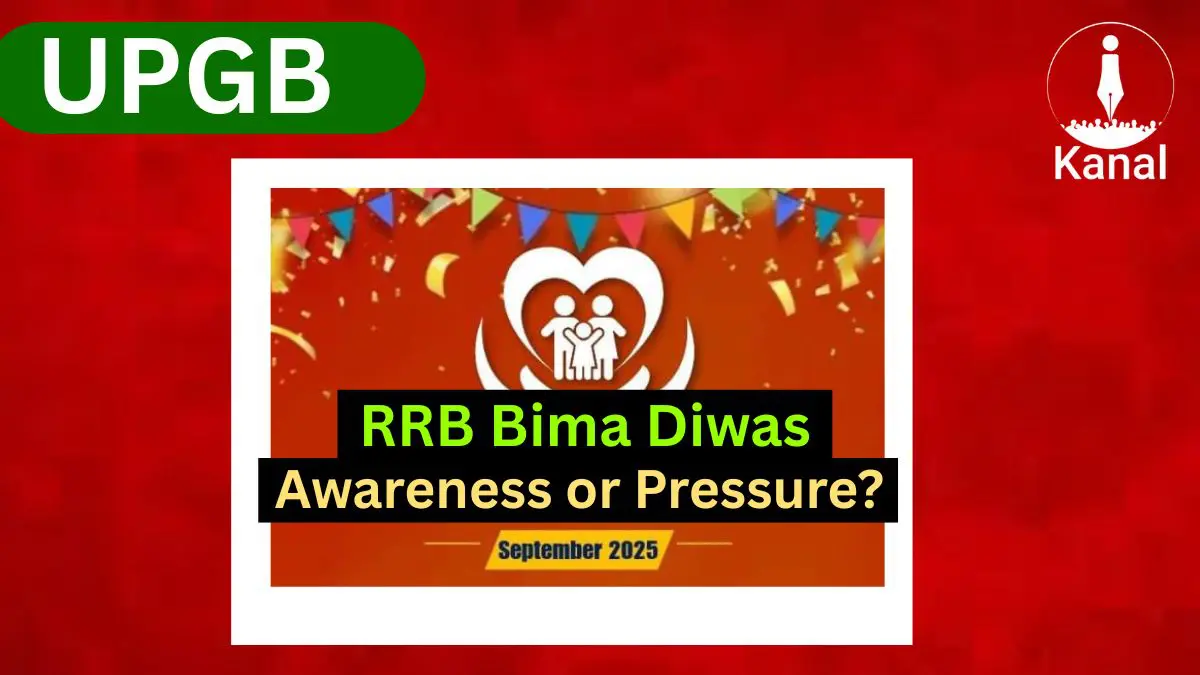New Delhi: Uttar Pradesh Gramin Bank (UPGB) is observing RRB Bima Diwas from September 2 to September 10, 2025, encouraging branch performance through a rewards system tied to insurance sales. While this initiative aims to promote financial protection awareness, employees express concerns that it may be transforming into a pressure-driven sales tactic instead of focusing on genuine customer engagement and education.
Understanding RRB Bima Diwas
RRB Bima Diwas is a campaign initiated by UPGB that runs from September 2 to 10 each year, designed to raise awareness about rural banking and insurance benefits. This year’s campaign is particularly centered on rewarding branch performance, with sales milestones established that aim to incentivize staff engagement and achievement.
Incentives for Performance: Reward Slabs
The campaign features a tiered rewards system where branches can qualify for material incentives based on the insurance sales they achieve. Categories such as Samrat, Sartaj, and Shahenshah are designated for different sales thresholds, effectively gamifying the sales process for various branch teams. The specific rewards include:
| Category | Sales Target | Incentive |
|---|---|---|
| Samrat | ₹50,000 | Kent Hand Blender |
| Sartaj | ₹1,00,000 | Kairos Oven Toaster Griller |
| Shahenshah | ₹1,50,000 | Texum Car Washer |
Through this structure, the UPGB aims to motivate branch staff to achieve set sales targets. However, while the incentivization could spur productivity, deeper concerns regarding employee well-being have emerged.
Branch Performance Campaign: Additional Focus on Premium Collection
In tandem with the general awareness initiative, the “Branch Performance Campaign” was unveiled, which runs concurrently and adds another layer of challenge for the staff. This campaign links the collection of insurance premiums to freshly minted titles like “Rising Star,” providing additional rewards for meeting these targets. The tiered rewards in this campaign include:
- Rising Star (₹25,000 Premium): Branded Earbuds
- Star (₹50,000 Premium): Leather Laptop Bag
- Super Star (₹1,00,000 Premium): Air Fryer and Trolley Bag
While these initiatives intend to foster a motivated workforce, they raise a significant question: is the primary aim to enhance financial literacy and protection, or is it more about driving sales at any cost?
Concerns About Pressure-Driven Sales
Critics of RRB Bima Diwas have voiced their discontent through social media platforms, labeling the day as “Torture Day” for staff due to the high-pressure environment it creates. Employees have reported facing severe repercussions for not meeting sales targets, including abusive treatment, threats of transfers, and even formal disciplinary actions. These alarming comments shed light on a broader issue: the mental strain and stress that can lead to severe consequences, such as burnout or, in extreme cases, even suicides among bankers.
The real challenge for UPGB, and similar banking institutions, lies in striking a balance between achieving sales goals and ensuring that employees maintain their mental health and job satisfaction. The pursuit of financial inclusion must not come at the expense of financial and emotional stability for workers.
The Road Ahead: Balancing Sales with Well-being
As RRB Bima Diwas unfolds, it serves as a pivotal case study for understanding the dynamics between sales performance and employee welfare in the banking sector, particularly in rural areas. While the need for financial literacy and customer engagement is undeniable, the structure of incentive programs must evolve to prioritize staff welfare alongside business objectives.
For banking institutions striving for growth and sustainability, this is a wake-up call. They must design rewarding structures that resonate with employees rather than burden them. Perhaps introducing flexible targets, non-monetary recognition, or even education-based incentives could create a more positive working atmosphere.
For a thriving Indian economy, particularly in rural banking, it’s essential to foster an environment where financial services not only reach underserved populations but also empower the staff delivering those services. The forthcoming months will be crucial for UPGB as it navigates these challenges, ensuring it promotes financial inclusivity without compromising employee well-being or customer trust.
Bankerpedia’s Insight 💡
The Uttar Pradesh Gramin Bank’s RRB Bima Diwas highlights a crucial shift in rural banking, where the push for insurance sales risks overshadowing genuine financial literacy efforts. While financial protection is vital, the pressure-induced sales environment raises serious concerns about employee well-being and the integrity of customer relationships. This could lead to long-term damage in trust, essential for the stability of India’s banking sector. Stakeholders must advocate for responsible sales practices that prioritize education and support over mere targets. Readers should remain aware of these dynamics when engaging with banking services.
How Does This Affect the Banking Ecosystem? 🏦
- Bank Employees → Increased sales pressure may harm employee well-being.
- Bank Management → Increased pressure on staff may harm morale and trust.
- Bank Customers → Increased pressure may lead to aggressive sales tactics.
- Investors / Shareholders → Increased regulatory scrutiny and potential reputational risks.
- Regulators (RBI, SEBI, Govt.) → Increased scrutiny on sales practices and employee welfare concerns.
- General Public → Increased pressure on bank staff affects customer service quality.
Research References 📚
Loved our Research? ❤️
Bankerpedia turns financial confusion into clarity!
Subscribe to our YouTube channel for unbiased insights, financial literacy & practical banking wisdom.










